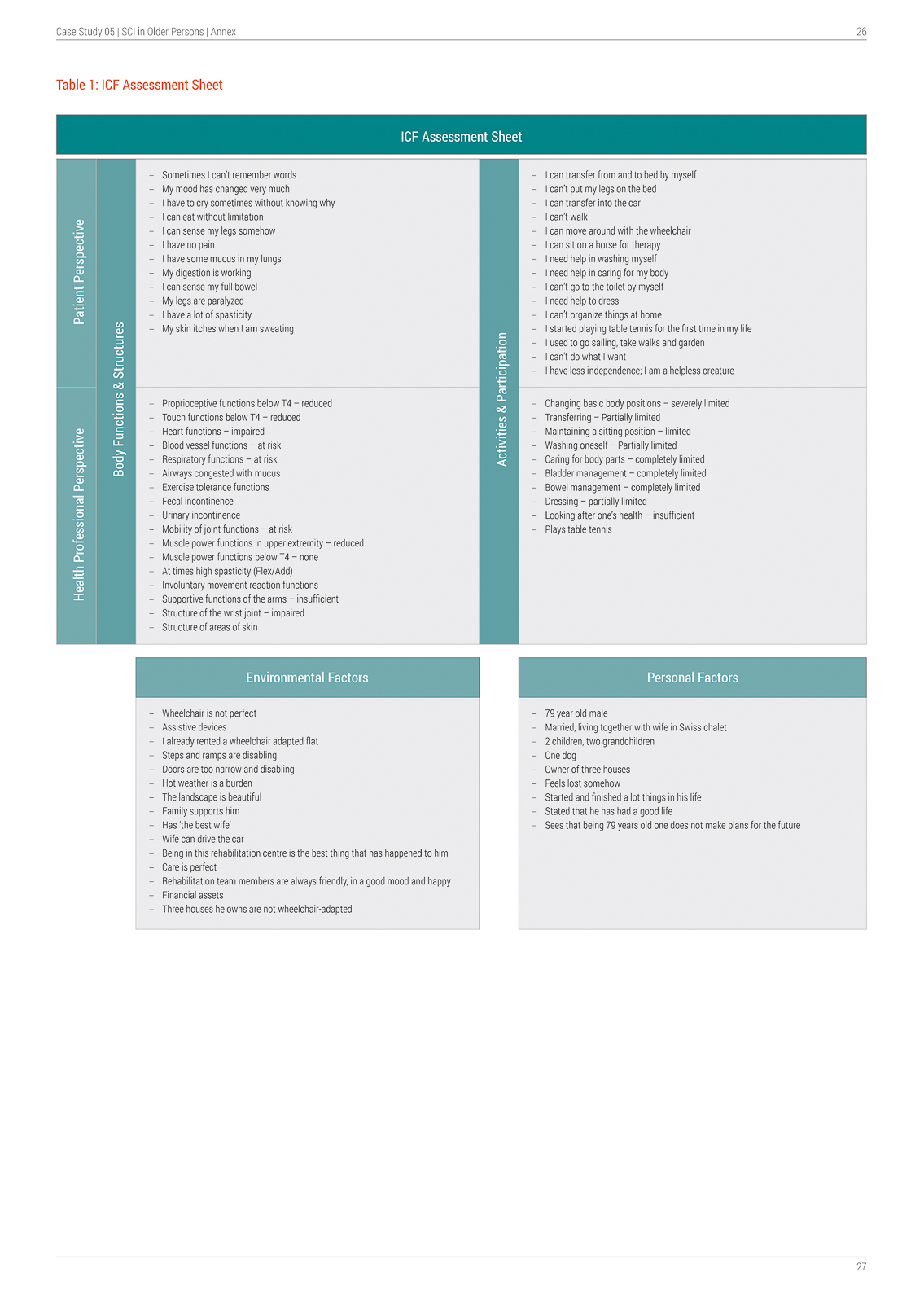Assessment
This assessment was based on the description of ICF components (body functions and structures, activities and participation, environmental and personal factors). It helped identify what he and his rehabilitation team saw as outstanding needs and individualized problems – some of which were age-related.
Table 1 shows the ICF Assessment Sheet that was used to document, in Mr. Meier's own words, his experience of functioning in the component of activities and participation, as well as the results from the clinical assessment conducted by the rehabilitation team using ICF terminology. The environmental and personal factors reflected the combination of information received from Mr. Meier as well as the observations of the rehabilitation team.

Table 1: ICF Assessment Sheet
At the moment, I don’t have any discomfort … I just can’t walk. Worst of all, I still can’t go to the bathroom on my own. Being in this condition makes me utterly helpless...The rehabilitation team keeps telling me that I’ve been a model student and patient, but I just don’t see this at all...My mood is extremely unstable at the moment. It’s difficult for me to even talk about it. Sometimes I just start crying! This is terrible for a grown man. I’ve never cried before in my life, never had this problem! I used to feel like a normal man.
Mr. Meier
For Mr. Meier there was a variety of age-related physical, psychological as well as personal factors that impacted the progression of his disease and the pace of recovery. Therefore, it was important to take stock of these issues at the start of this Rehab-Cycle®.
Beyond the age-related factors, consequences of the extensive period during which his condition was serious and he was restricted to bed included low tolerance for exercise and reduced muscle power functions in the upper extremity. These body function issues resulted in a problem in another body function i.e. inadequate supportive functions of his arms. These body function impairments became critical factors in his rehabilitation. Combined with disease-related issues, they also placed significant limitations on Mr. Meier's activities.
Cognitively, Mr. Meier was having trouble with his memory; he himself recognized that the act of recalling certain words became challenging for him. Psychologically he continued to have intense mood swings, often leading him to cry for no reason (as perceived by Mr. Meier).
""Being in this condition makes me utterly helpless.""
Other issues were more or less independent of age – positive environmental factors included Mr. Meier's financial assets and property, and positive personal factors included his feeling of accomplishment and the perception that he has led a good life. He also felt no need to make lots of plans for the future.
With regard to Mr. Meier’s body functions and structures, he felt no pain and experienced some sensation in his legs. Urinary and defecation functions were completely impaired; this, in turn, led to complete dependency on bladder and bowel management. Being dependent on others, especially for toileting, was particularly difficult for Mr. Meier. Moreover, the loss of muscle power functions in the lower half of the body and increasing spasticity in the legs made it difficult for him to transfer from bed to wheelchair and back as well as change his body position from a lying to a sitting position. He also suffered from itchy skin, probably due to medication.
With regard to activities and participation, Mr. Meier experienced many of the same common complaints as others with incomplete paraplegia i.e. an inability to walk, wash and care for himself and a need for assistance in getting dressed. Regarding mobility, the rehabilitation team felt that Mr. Meier's wheelchair (an environmental factor) was less than optimal and additional assistive devices would be necessary to achieve optimal functioning. After his tracheostomy tube was removed, he was able to eat without significant limitation and his digestion functioned normally.
""Having to stay at the rehabilitation centre prevented him from participating in life at home and from managing his property.""
Based upon the assessment results Mr. Meier and his rehabilitation team mutually agreed upon a set of goals. These goals were documented on the ICF Categorical Profile.